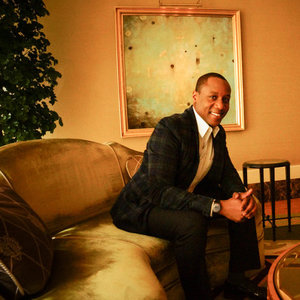Q&A: Anthony P. McGlaun
By Hamidah Glasgow | December 28, 2017
Anthony P. McGlaun researched, developed and performs a dynamic program of vocal recital and exploration of the American songbook involving race and African-American heritage.
Anthony P. McGlaun is a Detroit, Michigan native, he received a Bachelor of Arts in Music from Morehouse College and a Master of Music from the University of Northern Iowa. Upon his return to Detroit, Mr. McGlaun joined the faculty of Marygrove College where he served as Director of Vocal Activities and Assistant Professor of Music from 2004-2009. Anthony McGlaun is a member of the American Guild of Musical Artists (AGMA), Screen Actor's Guild (SAG) and the Actors Equity Association. McGlaun is also a member of Associated Solo Artists, a non-profit organization that provides artistic interdisciplinary programs to children, teachers, businesses and social establishments across the globe. Mr. McGlaun is a much sought-after soloist, recitalist, lecturer and Master class presenter. He specializes in the Negro Spiritual and work of African-American composers.
HG: You are a celebrated classically trained tenor and have performed all over the United States. Now you are based in Fort Collins, Colorado developing and performing your own program that follows the history of black American music. Please tell me about this.
APM: I focus on social justice work through music to garner and facilitate uncomfortable conversations. The classical music of African American Composers and writers often deal with the plight of African Americans and offer an insight into history in a way that popular music for which we are known for does not.
HG: The history books have largely left out the significant contributions to the US that black Americans have made. This is true not only in music but all areas of life. Due to this miscarriage of the telling of history most white Americans have very little understanding of black life other than the stereotypes that are presented in film, TV, and advertising. You address this in your program. Tell me more about this?
APM: It is often said that the victor, not the victim dictates history. I think you are correct is making note that African American history is not taught in America based on several things the biggest is the institution of slavery and the fall out from that. We know that African Americans were not allowed access to education because education is power and so through keeping this from them it was a way of control and a different t form of slavery. As an educated African American male I feel it is my responsibility to take back and control the narrative that is about My People. I like to research the history of slavery, voting rights, political groups and actions and arts of African Americans. I also use this subject matter in the songs that I sing and the poetry that deals with some of these issues. I then bring this historical information up in performance as I dialogue with the audience.
HG: What brought you to this deep scholarship of the music that you perform?
APM: I’m a graduate of Morehouse College is directly black all-male University in Atlanta Georgia where I had all black professors in my department of music some of them were composers and worked with different groups and had the music performed in the class that influenced my interest in the news craft making class book of the performers and composers and then when I went to graduate school with universe northern Iowa my teachers at the time deal Taylor was a scholar in African-American music, and I got the book from him, and so I just continue to study and work and out researching perform this music.
HG: Was there a moment in time that you realized that this is what you would be doing? Or was it a gradual realization?
APM: I always knew that I preferred this music. To use it as a platform for social justice and discussion came after several years of teaching on the collegiate level and the understanding grew that students hadn't heard or been aware of the history of our music. With our current social and political environment in America I use the words of the songs as a gateway for expression and communication.
HG: Having difficult conversations is a great topic. Who is your audience? When performing in predominantly white areas to mostly white audiences how do you present the work in ways that allow people access to unfamiliar history and music?
APM: The audience is ideally made up of people struggling with activism or recognizing strategies for change that affect people that don’t look like them.
I present the conversation by performing a song, discussing with the audience three aspects of the song. The audience gets a copy of the text, and I talk the audience through the text opening it up for them to ask questions and also giving them Historical events.
HG: Do you alter the performance according to the audience? Is the performance the same in Fort Collins as it is in Detroit where you started?
APM: Each performance is geared toward the intended audience. Whether I perform before a high school, college or a church group, I have to be very careful in putting together a program that will educate and inspire the audience. For me, I’m cautious about what issues to address with children based on their age. There are some subjects that I feel are important for the parents first to discuss. One must also consider the historical geography of the audience. Issues are important in Fort Collins would not be the same in Detroit.
HG: Thank you!
Anthony P. McGlaun
